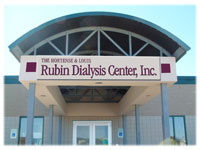
This site is dedicated to providing you with up to date
news and events, plus information about our facilities.
Please bookmark our site now for future reference.







by Amy Fensterer, RD, CDN
It is not unusual for a dialysis patient to have problems with their bones. Their bones tend to become thin and weak, which causes them to break easily or begin to hurt. This happens because calcium begins to come out of the bones.
What causes this problem?
The most common types of bone disease happen when:
1. The phosphorus in your blood becomes too high causing a change in the balance between calcium and phosphorus leading to loss of calcium from your bones.
2. Four small glands (parathyroid glands), which help regulate calcium in your body, become too active.
Each type of bone disease affects your bones in a different way.
1. Phosphorus is in most foods you eat and your kidneys usually remove whatever is not needed in the body. When your kidneys have stopped working normally (a dialysis patient) phosphorus may build up in your blood. Too much phosphorus in your blood leads to loss of calcium from your bones, which tends to weaken them.
Eating foods low in phosphorus can help to prevent phosphorus from building up in your blood. You also need to take a phosphate binder (PhosLo, Renagel, Tums) with all meals, which keeps the phosphorus in your food from being absorbed.
2. When the phosphorus in your blood becomes too high, the calcium level in your blood tends to drop. This causes four small glands in your neck (parathyroid glands) to become too active. When this happens, calcium is removed from your bones causing them to weaken.
Usually, this problem can be helped by following a low phosphorus diet and by taking certain medicines such as calcium and receiving vitamin D (Zemplar, Hectorol), during your treatment. Sometimes surgery is necessary to remove some of these glands.
How can diet help to prevent bone disease?
By reducing the phosphorus in your diet and by taking your phosphate binders, you can help prevent the amount of phosphorus in your blood from becoming too high. Foods high in phosphorus include: dairy products such as milk and cheese, peanut butter and nuts, dried beans and peas, and beverages such as cola, cocoa and beer.








webmaster@lergraphics.com